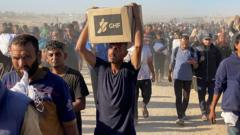The recent killings of civilians seeking food aid at a distribution centre in Gaza have intensified backlash against Israel's new aid system, indicating a troubling failure to ensure humanitarian access amidst conflict.
Killing of Civilians at Gaza Aid Centre Sparks Global Outrage

Killing of Civilians at Gaza Aid Centre Sparks Global Outrage
Tragic violence at a food aid distribution site in Gaza highlights failures in humanitarian aid distribution.
Witnesses and international medical teams described chaotic scenes early Tuesday morning as Israeli troops opened fire on Palestinians converging on the newly established aid distribution site in southern Gaza. A foreign witness characterized the event as "total carnage," starkly contrasting the Israeli military's statement, which claimed that warning shots were issued as "several suspects" deviated from authorized access routes toward the forces.
The tragic events have reignited criticism of the controversial Gaza Humanitarian Foundation (GHF) distribution strategy, which was introduced by Israel with U.S. backing following stringent restrictions that rendered the population vulnerable to famine. The GHF, employing armed security by an American firm, replaced the previous distribution system managed by the United Nations and experienced international aid organizations.
Israel's government argues that this new system is necessary due to allegations that UN personnel allowed Hamas to hijack aid supplies intended for civilians, claims which the UN categorically denies. However, the resignation of the GHF's leader, Jake Wood, less than two weeks ago, indicated significant shortcomings in adhering to essential aid principles of humanity and neutrality.
The operation of the GHF has revealed glaring flaws. Unlike the well-established UN distribution network which provided crucial food to communal kitchens, the GHF forces civilians into perilous journeys through conflict zones for basic rations. The process has often devolved into chaos, where the strongest can seize aid while vulnerable individuals are left empty-handed. As desperation mounts, many Palestinians have resorted to queuing for hours or even overnight to secure basic supplies, increasingly leading to fatal encounters with Israeli forces.
In light of the ongoing violence, UN High Commissioner for Human Rights Volker Türk condemned the GHF initiative, stressing the dire conditions that compel civilians to risk their lives for food and medicine. He remarked on Israel's apparent violation of international humanitarian standards, highlighting a disturbing trend of utilizing food insecurity as a tool of war strategy against Hamas.
As international calls for accountability grow, the GHF's operational failures coincide with the increasing demands from key allies like the UK, France, and Canada for improved humanitarian conditions in Gaza. These nations have threatened concrete actions, including potential sanctions and recognition of Palestinian statehood, if Israel does not alter its aggressive stance in the region.
The recent fatalities at the aid site serve as a grim reminder of the urgent need for humanitarian reform in Gaza, revealing the dire reality of aid distribution amid ongoing conflict and the deepening isolation of Israel on the global stage.
The tragic events have reignited criticism of the controversial Gaza Humanitarian Foundation (GHF) distribution strategy, which was introduced by Israel with U.S. backing following stringent restrictions that rendered the population vulnerable to famine. The GHF, employing armed security by an American firm, replaced the previous distribution system managed by the United Nations and experienced international aid organizations.
Israel's government argues that this new system is necessary due to allegations that UN personnel allowed Hamas to hijack aid supplies intended for civilians, claims which the UN categorically denies. However, the resignation of the GHF's leader, Jake Wood, less than two weeks ago, indicated significant shortcomings in adhering to essential aid principles of humanity and neutrality.
The operation of the GHF has revealed glaring flaws. Unlike the well-established UN distribution network which provided crucial food to communal kitchens, the GHF forces civilians into perilous journeys through conflict zones for basic rations. The process has often devolved into chaos, where the strongest can seize aid while vulnerable individuals are left empty-handed. As desperation mounts, many Palestinians have resorted to queuing for hours or even overnight to secure basic supplies, increasingly leading to fatal encounters with Israeli forces.
In light of the ongoing violence, UN High Commissioner for Human Rights Volker Türk condemned the GHF initiative, stressing the dire conditions that compel civilians to risk their lives for food and medicine. He remarked on Israel's apparent violation of international humanitarian standards, highlighting a disturbing trend of utilizing food insecurity as a tool of war strategy against Hamas.
As international calls for accountability grow, the GHF's operational failures coincide with the increasing demands from key allies like the UK, France, and Canada for improved humanitarian conditions in Gaza. These nations have threatened concrete actions, including potential sanctions and recognition of Palestinian statehood, if Israel does not alter its aggressive stance in the region.
The recent fatalities at the aid site serve as a grim reminder of the urgent need for humanitarian reform in Gaza, revealing the dire reality of aid distribution amid ongoing conflict and the deepening isolation of Israel on the global stage.





















